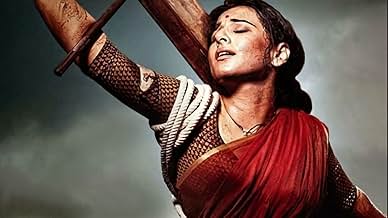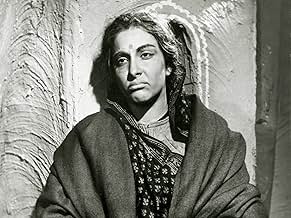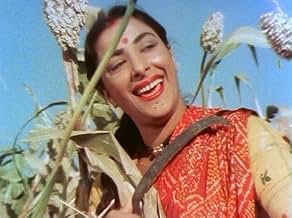CALIFICACIÓN DE IMDb
7.8/10
10 k
TU CALIFICACIÓN
Agrega una trama en tu idiomaIn this melodrama, a poverty-stricken woman raises her sons through many trials and tribulations. But no matter the struggles, she always sticks to her own moral code.In this melodrama, a poverty-stricken woman raises her sons through many trials and tribulations. But no matter the struggles, she always sticks to her own moral code.In this melodrama, a poverty-stricken woman raises her sons through many trials and tribulations. But no matter the struggles, she always sticks to her own moral code.
- Nominado a 1 premio Óscar
- 8 premios ganados y 2 nominaciones en total
Rajendra Kumar Tuli
- Ramu
- (as Rajendra Kumar)
Kanhaiyalal Chaturvedi
- Sukhilala
- (as Kanhaiya Lal)
- Dirección
- Guionistas
- Todo el elenco y el equipo
- Producción, taquilla y más en IMDbPro
Opiniones destacadas
I hate bollywood. But this isn't bollywood. This is epic, moving important filmmaking. The story is heartbreaking, the imagery is fabulous, even in Technicolor, and the music is, for once, really rather good. The songs do actually seem to signal major changes in the plot, rather than being tacked-on, globetrotting, multicostume sex-substitutes. Sadly for me, the DVD version I saw had subtitles for everything apart from the song lyrics, but the physical acting was so strong that it didn't matter. Yes, there are amateurish moments, and in the middle of the film, it takes some time off from the serious tone for an unnecessary extended piece about teasing girls. But that really is the only complaint I can make about this film. Essential viewing.
In this melodrama, a poverty-stricken woman raises her sons through many trials and tribulations. But no matter the struggles, always sticks to her own moral code.
"All Hindi films come from Mother India," said Javed Akhtar, the Hindi cinema poet, lyricist and scriptwriter. And of that I have no doubt. It does seem to be a very strong touchstone of Indian cinema, and one of the earliest films from India to get an international audience fawning.
But this is, perhaps paradoxically, the reason I do not care for the film. It is nothing that the Indian cinema has done ,but for some reason I just never care for Indian films, this one included. The grand, over-the-top nature of them, the singing where singing should not be by people who should not singing... the trend has gotten worse today, but I can see the germ here.
"All Hindi films come from Mother India," said Javed Akhtar, the Hindi cinema poet, lyricist and scriptwriter. And of that I have no doubt. It does seem to be a very strong touchstone of Indian cinema, and one of the earliest films from India to get an international audience fawning.
But this is, perhaps paradoxically, the reason I do not care for the film. It is nothing that the Indian cinema has done ,but for some reason I just never care for Indian films, this one included. The grand, over-the-top nature of them, the singing where singing should not be by people who should not singing... the trend has gotten worse today, but I can see the germ here.
In present day India, elderly mother Nargis (as Radha) is reluctant to attend the ceremony opening a new water canal for her village. Eventually agreeing, the old woman recalls her life
We begin with Ms. Nargis' marriage to Raaj Kumar (as Shamu). The very attractive young couple are blissfully in love. Farmers by trade, they have three children. But, all is not well. The couple have borrowed from greedy money-lender Kanhaiyalal (as Sukhilala). They do not seem to be aware of the fact, but Mr. Kanhaiyalal has cheated them out of land and future profits...
Dealing with the money-lender meant Nargis and her family work harder and harder, for less and less. Adding to the tragedy is a faming accident. Then, the children are threatened with starvation. At one point, Nargis considers prostituting herself to Kanhaiyalal, who desires the woman as well as her money. She resorts to begging, and saves son Sajid Khan (as Birju) with a few grams of food. "Master Sajid" is the son you should be watching, by the way. And, you won't have any trouble finding him - young Khan takes over the screen for a good portion of the movie...
Khan grows up to be Sunil Dutt (as the adult Birju). Rajendra Kumar is "Ramu" the more stable son. Mr. Dutt continues to be the "bad boy" of the village. You'll notice "Birju" the young man is very reminiscent of "Birju" the boy. As a boy, he didn't like the money-lender. As a man, Mr. Dutt holds Kanhaiyalal responsible for his family's misfortunes. Dutt decides to take matters into his own hands. Nargis loves and protects her son, but wants to honor the community's decisions regarding the old loan and "interest" agreed upon. This leads to a conflict between "Mother India" and son...
This classic film was an huge critical and commercial success; it almost won the "Academy Award" for best foreign language film of 1957. "Mother India" isn't easy to watch, however, even if you like foreign films. It startles with traditional musical interludes, makes unaccustomed cultural connections, and runs almost three hours. If bravely enduring a second viewing, you could get engrossed in Nargis. There is fascinating symbolism and story-telling herein. Near the end, Nargis makes a decision regarding her son which is thought-provoking - does it contradict her earlier emotions and stated beliefs?
******* Mother India (2/14/57) Mehboob Khan ~ Nargis, Sunil Dutt, Sajid Khan, Rajendra Kumar
Dealing with the money-lender meant Nargis and her family work harder and harder, for less and less. Adding to the tragedy is a faming accident. Then, the children are threatened with starvation. At one point, Nargis considers prostituting herself to Kanhaiyalal, who desires the woman as well as her money. She resorts to begging, and saves son Sajid Khan (as Birju) with a few grams of food. "Master Sajid" is the son you should be watching, by the way. And, you won't have any trouble finding him - young Khan takes over the screen for a good portion of the movie...
Khan grows up to be Sunil Dutt (as the adult Birju). Rajendra Kumar is "Ramu" the more stable son. Mr. Dutt continues to be the "bad boy" of the village. You'll notice "Birju" the young man is very reminiscent of "Birju" the boy. As a boy, he didn't like the money-lender. As a man, Mr. Dutt holds Kanhaiyalal responsible for his family's misfortunes. Dutt decides to take matters into his own hands. Nargis loves and protects her son, but wants to honor the community's decisions regarding the old loan and "interest" agreed upon. This leads to a conflict between "Mother India" and son...
This classic film was an huge critical and commercial success; it almost won the "Academy Award" for best foreign language film of 1957. "Mother India" isn't easy to watch, however, even if you like foreign films. It startles with traditional musical interludes, makes unaccustomed cultural connections, and runs almost three hours. If bravely enduring a second viewing, you could get engrossed in Nargis. There is fascinating symbolism and story-telling herein. Near the end, Nargis makes a decision regarding her son which is thought-provoking - does it contradict her earlier emotions and stated beliefs?
******* Mother India (2/14/57) Mehboob Khan ~ Nargis, Sunil Dutt, Sajid Khan, Rajendra Kumar
This was a movie about a strong woman of honor, Radha (Nargis) and her family, a usurious man, and the poor village they live in. The lender breaks villagers' backs by charging interest at such a high rate that they give something like 3/4 of their laborious harvest to the lender just to cover interest, keeping the debt in perpetuity. Almost nobody around can read, so the terms of the original contract are never clear. Though the situation keeps the woman's family downtrodden financially, she staunchly preserves her pride and dignity.
One of her sons, Birju (Sunil Dutt), is portrayed as always being a "problem" right from childhood, and while I could understand his rage against the moneylender, I found his vengeance hard to believe, especially the self-destruction that pitted him against his own family members. I like the ending and really laud Radha, who realized that one's dignity and honor is priceless and shouldn't be bartered away.
I found the film to be too long (it lasted around 3 hours); the story could have been just as compelling if it were an hour shorter. I would recommend the film and would rate it 6 on a scale of 10. I saw it as part of an Indian film festival, where it was projected on a movie screen from DVD and had English subtitles.
One of her sons, Birju (Sunil Dutt), is portrayed as always being a "problem" right from childhood, and while I could understand his rage against the moneylender, I found his vengeance hard to believe, especially the self-destruction that pitted him against his own family members. I like the ending and really laud Radha, who realized that one's dignity and honor is priceless and shouldn't be bartered away.
I found the film to be too long (it lasted around 3 hours); the story could have been just as compelling if it were an hour shorter. I would recommend the film and would rate it 6 on a scale of 10. I saw it as part of an Indian film festival, where it was projected on a movie screen from DVD and had English subtitles.
Nargis stars as a suffering woman, Radha, experiencing tragedy after tragedy, surviving it all. The first half of the film doesn't promise anything overly special. A poor community falls under the weight of a moneylender, Sukhilala. When Radha marries, her mother-in-law mortgages her farm to pay for the wedding and Radha's jewlery. Since the mother-in-law has no education whatsoever, Sukhilala, probably the only educated man in the village, is able to take advantage of her. When she challenges Sukhilala's claim, she can't do much to disprove their deal. This part of the story is pretty cliché, rather predictable and very questionable. Sukhilala is a fairly standard villain, very cartoonish and simplistic. The audience is programmed to hiss at his every appearance. The conflict is compelling, but I was hoping for something more complex. It is nice, I suppose, to see the system challenged, but the fact that the system is challenged does not necessarily mean that the film challenges the system in an insightful manner. In reality, the film's solutions to the problems are all melodramatics.
Luckily, something else is brewing in the film at this point. Radha has two sons, Ramu and Birju. The story starts to focus in on Birju, who is very obnoxious. His mother loves him dearly, spoils him, and he becomes simply evil. I should say at this point that the little kid who plays him as a child, Master Sajid, is very, very annoying, not to mention a terrible little actor. As an adult, Birju is a devil. Sukhilala still runs the place, and now Birju is big enough to do something about it. Thankfully, Birju is not made a hero. Well, perhaps an anti-hero, but at least we're spared him becoming an Indian Robin Hood as I expected. Complexities begin to develop in the way Sukhilala is depicted, and, while he's still the villain, the audience is no longer programmed to despise him on site. Radha has to both protect her son and stand up for what is right. The climax is so extremely impressive that I was almost convinced that the film was great.
Yet the film is not what I would call great as a whole. There were dozens of scenes that I loved, but, as the film goes on for three hours, there was plenty to dislike, as well. The fat and gristle detract. Did I mention there are great songs? Great indeed! I love Hindi music myself. The cinematography is also often exceptional. 8/10.
Luckily, something else is brewing in the film at this point. Radha has two sons, Ramu and Birju. The story starts to focus in on Birju, who is very obnoxious. His mother loves him dearly, spoils him, and he becomes simply evil. I should say at this point that the little kid who plays him as a child, Master Sajid, is very, very annoying, not to mention a terrible little actor. As an adult, Birju is a devil. Sukhilala still runs the place, and now Birju is big enough to do something about it. Thankfully, Birju is not made a hero. Well, perhaps an anti-hero, but at least we're spared him becoming an Indian Robin Hood as I expected. Complexities begin to develop in the way Sukhilala is depicted, and, while he's still the villain, the audience is no longer programmed to despise him on site. Radha has to both protect her son and stand up for what is right. The climax is so extremely impressive that I was almost convinced that the film was great.
Yet the film is not what I would call great as a whole. There were dozens of scenes that I loved, but, as the film goes on for three hours, there was plenty to dislike, as well. The fat and gristle detract. Did I mention there are great songs? Great indeed! I love Hindi music myself. The cinematography is also often exceptional. 8/10.
¿Sabías que…?
- TriviaWas nominated for an Academy Award in the Best Foreign-Language Film category. It was India's first Oscar nomination.
- ConexionesFeatured in Century of Cinema: And the Show Goes On: Indian Chapter (1996)
Selecciones populares
Inicia sesión para calificar y agrega a la lista de videos para obtener recomendaciones personalizadas
- How long is Mother India?Con tecnología de Alexa
Detalles
- Tiempo de ejecución2 horas 52 minutos
- Relación de aspecto
- 1.37 : 1
Contribuir a esta página
Sugiere una edición o agrega el contenido que falta

Principales brechas de datos
By what name was Madre India (1957) officially released in Canada in English?
Responda


























